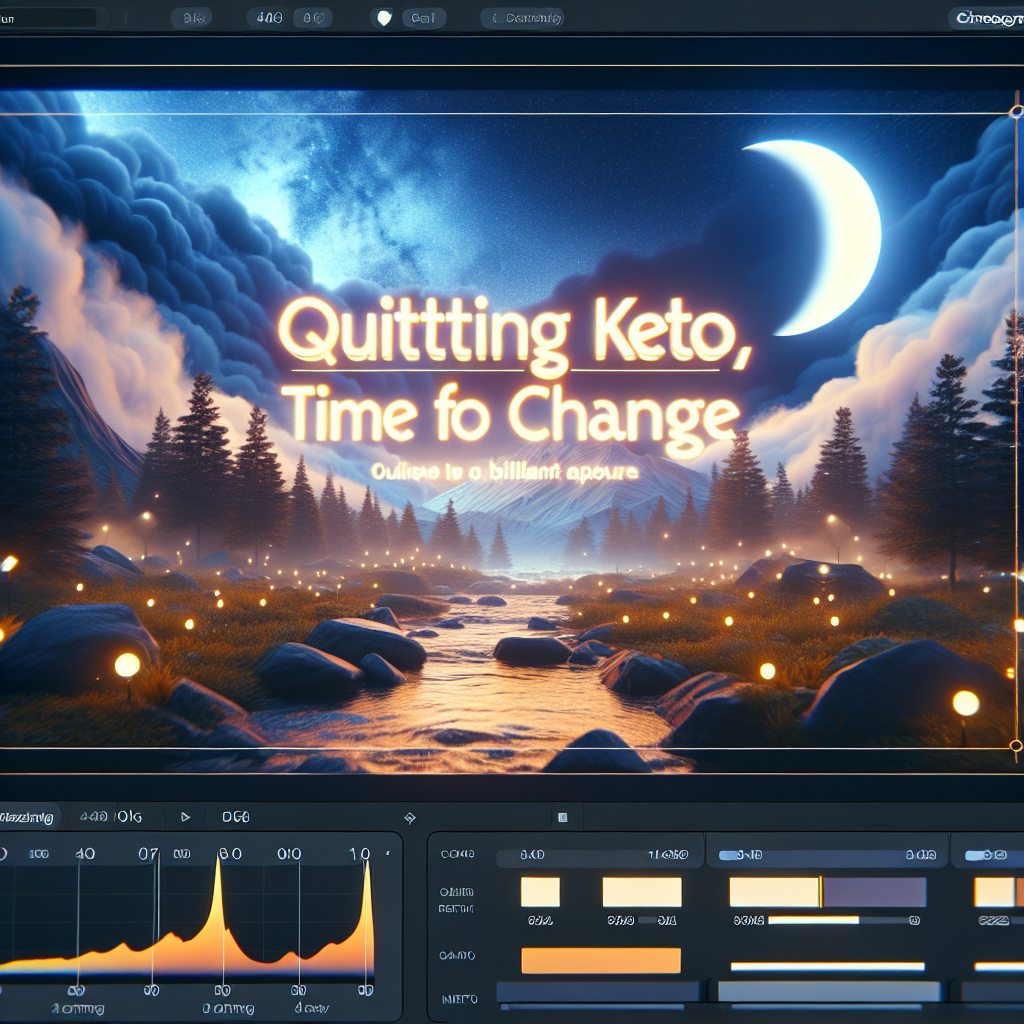
-
Table of Contents
Am I QUITTING Keto? Time for Change

Over the past few years, the ketogenic diet, or keto for short, has taken the world by storm. It has been hailed as a revolutionary way to lose weight, improve health, and increase longevity. However, like any diet, it’s not without its drawbacks. This article will explore the reasons why I am considering quitting the keto diet and the potential alternatives that could provide a more balanced and sustainable approach to health and wellness.
Understanding the Keto Diet
The ketogenic diet is a low-carb, high-fat diet that has been shown to help some people lose weight. The diet works by drastically reducing carbohydrate intake and replacing it with fat. This reduction in carbs puts your body into a metabolic state called ketosis, where fat, from your diet and from your body, is burned for energy.
While the keto diet can lead to significant weight loss, it’s not without its challenges. The diet can be difficult to follow, and it can lead to a variety of side effects, including the “keto flu,” which can cause fatigue, nausea, and headaches. Additionally, the diet can be hard on the liver and kidneys, and it can lead to nutrient deficiencies if not properly managed.
Despite these challenges, many people have found success with the keto diet. However, after following the diet for a significant period, I’ve found that it may not be the best fit for my lifestyle and health goals. Here’s why.
Reasons for Quitting Keto
While the keto diet has its benefits, there are several reasons why I am considering quitting. These include the restrictive nature of the diet, the potential for nutrient deficiencies, and the difficulty in maintaining the diet long-term.
Restrictive Nature of the Diet
The keto diet is highly restrictive, requiring you to limit your intake of carbohydrates to a very low level. This means that many foods, including fruits, vegetables, and whole grains, are off-limits. While this can lead to rapid weight loss, it can also make the diet difficult to stick to, especially in social situations.
Furthermore, the restrictive nature of the diet can lead to disordered eating patterns. A study published in the Journal of Eating Disorders found that individuals who followed a strict low-carb diet were more likely to exhibit signs of an eating disorder than those who followed a more balanced diet.
Potential for Nutrient Deficiencies
Because the keto diet limits the intake of many fruits, vegetables, and whole grains, it can be difficult to get all the nutrients your body needs to function optimally. This can lead to deficiencies in key nutrients, including fiber, vitamin C, potassium, and magnesium.
A study published in the American Journal of Clinical Nutrition found that individuals following a low-carb diet had lower intakes of these key nutrients, which could potentially lead to health problems down the line.
Difficulty in Maintaining the Diet Long-Term
While the keto diet can lead to rapid weight loss, maintaining this weight loss can be challenging. A review of studies published in the British Journal of Nutrition found that while low-carb diets like keto can lead to short-term weight loss, most people regain the weight within a year.
This is likely due to the restrictive nature of the diet, which can make it difficult to stick to long-term. Furthermore, the diet doesn’t teach sustainable eating habits, which are key to maintaining weight loss over time.
Alternatives to the Keto Diet
Given the challenges associated with the keto diet, I am considering alternatives that offer a more balanced and sustainable approach to health and wellness. These include the Mediterranean diet, the DASH diet, and a plant-based diet.
The Mediterranean Diet
The Mediterranean diet is based on the traditional foods that people in countries like Italy and Greece ate in the 1960s. The diet emphasizes eating fruits, vegetables, whole grains, and lean proteins, and it includes moderate amounts of dairy and limited amounts of red meat.
Research has shown that the Mediterranean diet can lead to significant weight loss and can reduce the risk of heart disease, certain cancers, diabetes, and other health problems. Furthermore, the diet is less restrictive than keto, making it easier to stick to long-term.
The DASH Diet
The DASH diet, which stands for Dietary Approaches to Stop Hypertension, is a diet plan that was developed to lower blood pressure without medication. The diet emphasizes eating fruits, vegetables, whole grains, lean proteins, and low-fat dairy, and it limits foods that are high in saturated fat and sugar.
Like the Mediterranean diet, the DASH diet has been shown to lead to weight loss and to reduce the risk of various health problems. Furthermore, the diet is less restrictive than keto, making it a more sustainable option for long-term health and wellness.
Plant-Based Diet
A plant-based diet focuses on foods primarily from plants. This includes not only fruits and vegetables, but also nuts, seeds, oils, whole grains, legumes, and beans. It doesn’t mean that you are vegetarian or vegan and never eat meat or dairy. Rather, you are proportionately choosing more of your foods from plant sources.
Research has shown that plant-based diets can lead to weight loss and can reduce the risk of heart disease, certain cancers, and other health problems. Furthermore, a plant-based diet can be less restrictive than keto, making it a more sustainable option for long-term health and wellness.
Conclusion
While the keto diet has its benefits, it’s not without its challenges. The restrictive nature of the diet, the potential for nutrient deficiencies, and the difficulty in maintaining the diet long-term are all reasons why I am considering quitting keto.
However, quitting keto doesn’t mean giving up on health and wellness. There are many other diets out there that offer a more balanced and sustainable approach to health and wellness, including the Mediterranean diet, the DASH diet, and a plant-based diet.
Ultimately, the best diet is one that you can stick to long-term and that provides all the nutrients your body needs to function optimally. Whether that’s keto, Mediterranean, DASH, plant-based, or something else entirely, the key is to find a diet that works for you and your lifestyle.